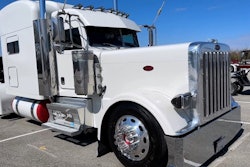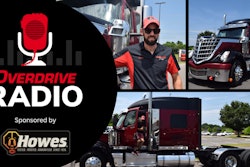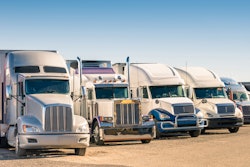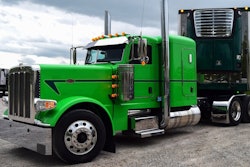Occasionally it feels like there are new developments in booting-and-towing rules and regulations somehow, somewhere around the country nearly every week. Attorneys John Dempsey and Martin E. Cain of the Moseley Marcinak LLP law firm flagged once such development in North Carolina near the top of their Friday, June 27, talk around the "predatory towing" topic.
Assuming the state's governor signs Senate Bill 311, as Overdrive reported June 30, the practice of booting a commercial truck during a parking enforcement action will become a misdemeanor offense. Perhaps more importantly, the legislation aims to prevent a tow company holding cargo "hostage" as a means of gaining leverage over a trucking company to pay an outsize invoice. Cain in his presentation used the term "extortionist invoices" to describe the predatory billing practice bad actor companies might use. "The vast majority of towing companies out there are honest folks just trying to make a living," he said, yet he offered examples of cases his firm's worked where the opposite was true:
- $500,000 for clean-up after a cargo spill
- $120,000 for a standard truck rolled over on a highway.
- $5,000-$10,000 for a boot removal or simple tow from a private property
The last of these "has become more prominent recently," Cain said. He also noted any towing company that advertises its rates can now be held liable under federal law for keeping to those rates in any tow. The "junk fees" rule, now codified in Title 16 of the Code of Federal Regulations, part 464, "prohibits hidden or misleading fees in any offers, display or advertisement of prices of covered goods or services," Cain noted, referring to parts of the extensive regulation. In future, it could provide an avenue to "push back against predatory practices," particularly if charges don't line up with advertised rates or are otherwise hidden.

Cain advised all truck owners and trucking companies to keep eyes out for such a case. Meantime, most legal cases against predatory towing will arise from local and state laws and regulations. Efforts to "get better laws on the books locally and at the state level," in addition to the recent movement in North Carolina, Cain noted, yielded fruit in recent years in a bevy of states, from Florida, Mississippi, Tennessee, Colorado and Maryland to Virginia. In the last of those, a new law in 2024 "provides regulation of private property impounds" in "several counties."
The state or local trucking or towing association where the tow occurred will be truckers' best resource on applicable law. Meantime, key questions to ask yourself will help you determine a course of action, whether legal or simply negotiating a solution with the towing company, when extortionist invoices or other predatory practices arise.
Are invoiced charges appropriate for/proportional to the work actually performed?
"Was the work even performed at all?" Cain also asked. Follow the advice in Overdrive's own guide to combatting predatory billing and document the scene of any tow in as detailed a manner as possible. Examine the invoice for duplications, charges for equipment, for extra people and other things that clearly weren't used during the tow or recovery -- or extra time that wasn't spent, which Cain has seen plenty of, like per-pound tow charges when "the weight of the vehicle being towed" wasn't known or isn't specified.
For private property/parking enforcement-type tows, such as commonly egregious examples shared in past coverage, compliance with local signage ordinances by the property owner or towing company could present an avenue for challenging a bill.
[Related: Parking perils: The increased cost, and risk, of booting and towing]
"Counties or cities might have their own local ordinances" to that effect, Cain noted. Again, it's a good idea to connect "with someone with expertise" in that area, such as a local/state trucking association. Any law enforcement agency involved, too, could have their own rules for towing providers for nonconsensual tows in the event of an accident.
The question to ask there is, at its most basic, "have they complied" with those rules? Cain said. If not, involving the governing authority in the dispute could yield results, with the help of an attorney or not. Attorneys might help with filing Freedom of Information Act requests with the governing authority (municipality for private property tows, law enforcement agency following an accident) asking for any "file on the towing company," said Moseley Marcinak attorney John Dempsey. That file may include any complaints previously lodged. Ask whether the area has "requirements for approved fees ... and whether they post fees."
Dempsey offered the example of a case he'd seen in a "particular state with a max-rate schedule" towing companies must abide by, he said. The trucking company got some relief on the invoice after discovering the towing company added a separate line item charge for winching on top of the rate when they "already had the equipment out there with the winch on it. That’s double billing."
[Related: How one small fleet owner marshaled local ordinances against a parking-lot trap]
If you're going to dispute an invoice, don't be too quick to pay it in efforts to get equipment and/or cargo released, Dempsey added. An attorney involved in any case might end up "overnighting a letter to the towing company requesting release of the tractor-trailer and cargo to the owner," he said, yet "we also request that you dispute the invoice. ... If you pay it and you don’t dispute it you may be in a state where you've waived your rights to sue them after you pay them."
There's a lot a skilled attorney can do to aid the process of getting equipment released, yet Cain advised any trucking business to think long and hard "about whether you want to be in litigation" with respect to any incident. "It's costly and time-consuming," and "sometimes the quickest solution would be to negotiate with the towing company."
Before the decision to pursue litigation, the main goal for most will be to "get the vehicle and product out of the company’s yard quickly as possible," Cain emphasized. The best path in most cases is to "pick up the phone and talk to the towing company. If you can establish contact and they're willing to negotiate the invoice, it's probably the best remedy to save time and expense and keep your customers happy."
A payment under protest/duress, as also detailed in our guide to beating back predatory truck tows, can be an option whereby you preserve your rights to challenge the invoice in future but also get cargo/equipment released. Dempsey recommended companies taking that route to be sure not to accede to demands for cash or a digital-system payment, rather "send out a check if at all possible," he said. "Then you’ll know where their banking is -- and you can collect post-judgement if it happens."
[Related: Roadside assistance networks: The best hedge against predatory towing?]










